Who are the key players at Gambia’s Truth Commission
Gambia’s Truth, Reconciliation and Reparations Commission has resumed its public hearings on June 10. Since January the TRRC has heard 57 witnesses in sessions that were particularly eventful and truth-revealing. It has become a major TV and radio show in the country and perhaps the most fascinating live transitional justice process at the moment. Here are short profiles of five of its key actors.
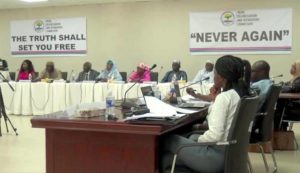
By JusticeInfo.Net
Abubacarr Tambadou, minister of justice
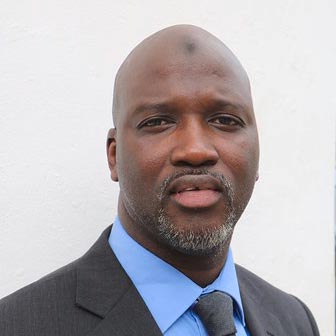
On April 10 and 11, 2000, over a dozen Gambian student protesters were shot and killed, reportedly on orders of the then president Yahya Jammeh. After the incident, the dictator brought a bill to the National Assembly enacting a law indemnifying all the soldiers who killed the students.
During the whole episode, many Gambian lawyers remained silent. Yet in this climate of fear would emerge the Coalition of Lawyers for the Defense of Human Rights that took it upon itself to defend the students despite huge personal risk. This is when Abubacarr Marie Tambadou’s first moment of fame in the field of human rights in Gambia came to fruition. “People used to call us trouble makers,” said Tambadou, reflecting on his past. “But we believed in the justness of the course we were taking.”
Tambadou was born on December 12, 1972. He acquired an LLB in law at the University of Warwick, United Kingdom, in 1997. In 2002, he would complete an LLM in international human rights law at the School of Oriental and African Studies, University of London. He first worked as a public prosecutor in Gambia in 1997 and two years later he became a state counsel for a year. Then he worked with his brother, Sheriff Tambadou, at his chambers in Banjul, the capital. From 2012 to 2016, he moved to Arusha, Tanzania, where he worked with Gambia’s current Chief Justice Hassan Jallow who was then chief prosecutor of the International Criminal Tribunal for Rwanda. Tambadou was Jallow’s special assistant.
Tambadou told Justiceinfo.net that he felt Jammeh’s end would come but he never thought he would be part of the change. Yet in February 2017, a month after Jammeh fled the country, Tambadou was appointed Gambia’s Justice Minister and Attorney General. In this position, he played a leading role in the structural design and implementation of the Truth, Reconciliation and Reparations Commission (TRRC). His ministry sent people to other countries that had truth commissions to understudy them for a successful implementation of Gambia’s. He also played a leading role in making the case to donors to ensure funding for the TRRC.
Tambadou shared a common background at international tribunals with Essa Faal whom he brought as lead counsel of the Truth Commission. However, unlike Faal, Tambadou was once an activist with a combative past under Jammeh’s dictator. While Tambadou was never arrested he challenged the former leader on his human rights records. This past may explain the energy with which Tambadou deals with crimes committed under Jammeh. While presenting the report of an inquiry into the financial activities of Jammeh to Gambia’s president Adama Barrow, the Minister of Justice used terms such as “pretentious”, “delusional lifestyle”, “egotistic megalomaniac”, and “unconscionable and criminal” to describe Jammeh.
A few weeks ago, Tambadou ordered the arrest of two people who were deemed not cooperative enough with the TRRC. At a recent meeting with the media, he said he would arrest any alleged perpetrator against whom more evidence would be found and who does not cooperate with the Commission. He is considered by many as the most performing member of Barrow’s administration. He has both a close working relationship with the media and the civil society.
Lamin Sise, chairman
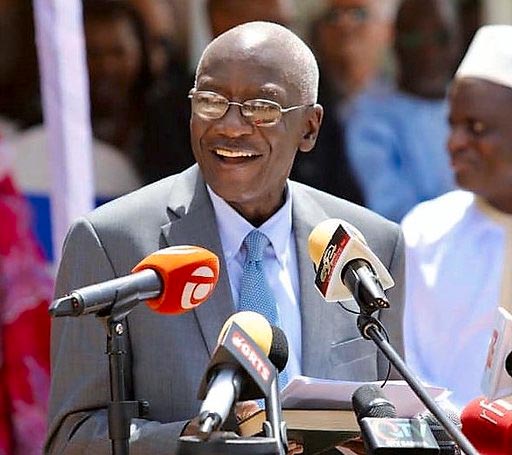
Unlike many people involved in the establishment of the TRRC, Lamin Sise is a new face, at least to most Gambians.
Sise was born in Bansang, a rural town over 300 kilometers from Banjul. He got his early education at Gambia’s only teacher training college before he attended university in the United States, where he got a Ph.D in international affairs at Johns Hopkins University. Then he worked with the United Nations for 30 years.
From 2008 to 2011 he was a senior adviser to Kofi Annan, the then U.N. secretary general. It was during this period that a National Reconciliation and Dialogue Commission was created in Kenya, following the 2007 electoral crisis. Later on, when Annan was appointed as Special Envoy for Syria, Sise served as his Chief of Staff. Both U.N. secretary generals Ban Ki Moon and Antonio Guterres recalled Sise into service on special assignments. In October 2018, Lamin Sise was appointed as chair of Gambia’s Truth Commission.
To an everyday Gambian, revelations before the Commission are not new—they are mostly a confirmation of a story they were part of or have heard of before. In a recent media interview, however, Lamin Sise confessed that it was shocking for him to hear about some of the things that had happened in Gambia. Testimonies at the TRRC hearings are often very emotional. Sise manifests a lot of it. During some highly charged testimonies, he almost shed tears. Testimonies of the wives of soldiers killed on November 11, 1994 – Batch Samba Jallow, Lamin Waa Juwara, among others – almost got him crying.
He can also have an occasional outburst of anger. When former junta member Sanna Bairo Sabally, in relations to the November 11 killings, talked in a tone that suggested that the Geneva Conventions were useless and were not observed in any war situation, Sise lost his cool. He recounted how he lectured soldiers, some of them United States soldiers, on the Geneva Conventions and the rules of war. Perhaps Sabally’s razor was too close to the bone.
This does not affect the general public ratings of Lamin Sise though. The TRRC Chairman is generally respected as a very principled person, attached to discipline and time keeping.
Baba Galleh Jallow, executive secretary
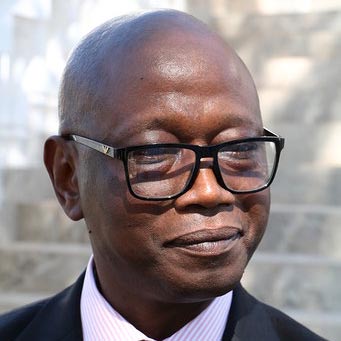
In 1994, when Gambia descended into military autocratic rule, one of the institutions that suffered most was the press. The media was a symbol of defiance and at the heart of that struggle was Baba Galleh Jallow.
Jallow was born in Farafenni, a bustling rural town about 100 kilometers from Banjul. He started journalism at Gambia’s Daily Observer while working at the West African Examination Council. When he was asked by the regional examination body to stop writing or be fired, he chose to lose his job. A week before the July 22, 1994 military coup that brought Yahya Jammeh to power, his employment at WAEC was terminated because of his refusal to give up journalism. He joined The Daily Observer where he started as an Assistant Editor.
In 1999, when the Observer was bought by Amadou Samba, a business tycoon believed to be associated with Gambia’s dictator Yahya Jammeh, Jallow resigned to establish The Independent, a radical paper he jointly owned with Alagi Yorro Jallow, another journalist from the Observer.
The two Jallows ran into trouble with the regime. The newsroom of the paper was partially burnt down in October 2003 allegedly by operatives working for Jammeh. Baba Galleh Jallow was accused of being a non-Gambian and his parents were arrested and interrogated by the National Intelligence Agency (NIA) in Farafenni. After too many arrests, detentions and harassment by both the Police Serious Crime Unit and the NIA, Baba Galleh Jallow got enough of it. He decided to flee to Senegal from where he left for the United States.
Jallow had acquired bachelor degrees in history and political science at Fourah Bay College, the University of Sierra Leone. Once in the U.S., he completed his master’s degree in Liberal Studies at Rutgers University, New Jersey, and got a Ph.D in African History from the University of California, Davis, in 2011. But he didn’t stop participating in Gambia’s political debate. After Jammeh was voted out, he returned home in 2017. In February 2018, he was appointed Executive Secretary of the country’s new Truth Commission.
During the setting up of the TRRC, Jallow played a major role in putting in place the administrative structures of the Commission. Though a larger part of the funding of the Commission is mobilized by the Justice Ministry, Jallow and his team also sought funding for other activities of the TRRC, like with the Catholic Relief Services for outreach programs.
Jallow is a fighter, with a strong ego. This does not always attract positive publicity. He may be perceived as someone who is often too firm in his views and may ignore others’. For instance, he started the TRRC with a difficult media partner, QTV, Gambia’s only private television, that caused trouble to journalists who wanted clean feeds from them. (The matter was eventually solved.) Another controversy took place when he brought in Alagie Barrow as lead investigator of the TRRC to start the ground work of investigation and statement-taking from victims. Critics said that the case of Alagie Barrow, a former coup plotter, may someday come before the Commission and that it was thus wrong to appoint him.
However, thanks to iron will and strong beliefs, Jallow is credited for making the TRRC a project that started with lot of sceptics only to become the most popular show on television.
Alagie Barrow, lead investigator
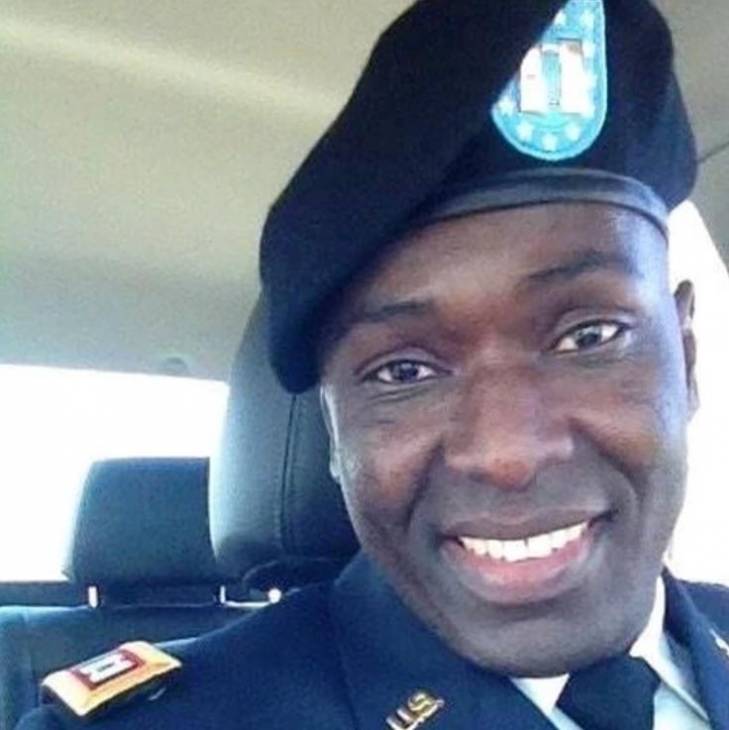
Public hearings at the Truth Commission are a product of the large amount of work done behind the scene by investigators. They are the pipers who determine the tune that eventually comes to the public.
Alagie Barrow is the director of research and investigation at the Commission. Of all the top appointees at the TRRC, Barrow’s was the most controversial. A former captain of the army of the United States army, where he had moved in 1994, Alagie is a symbol of resistance by all means against the former ruler Yahya Jammeh.
Disgusted by the human rights violations committed under Jammeh, he had joined hands with a couple of Gambians, largely based in the U.S., to attack Gambia’s State House in December 2014. The coup attempt was foiled and Barrow fled. Three people died during the attack.
After his return to the U.S., he was arrested and charged under the U.S. Neutrality Act for planning a coup in a friendly country. He pleaded guilty and was sentenced to 6 months in jail.
Barrow’s appointment attracted a huge controversy among Gambians who accused him of being part of an undemocratic attempt to overthrow a government through the use of arms.
Critics of Barrow’s appointment said he is conflicted. Their contention is that the three people who were killed by Gambian soldiers during the attack will have their own hearing at the TRRC and that this is a case the director of research and investigate cannot investigate. Some said he could recuse himself.
The TRRC defended his appointment, saying he is uniquely qualified for the job. Barrow appears to be as determined as he is outspoken against anything he considers to be wrong regardless of consequences or of the society’s views.
Barrow was born in Kiang Kaif. He holds a BSc. Degree in Criminal Justice from Tennessee State University and an MA degree in National Security from the American Military University in Charles Town, West Virginia.
Essa Faal, lead counsel
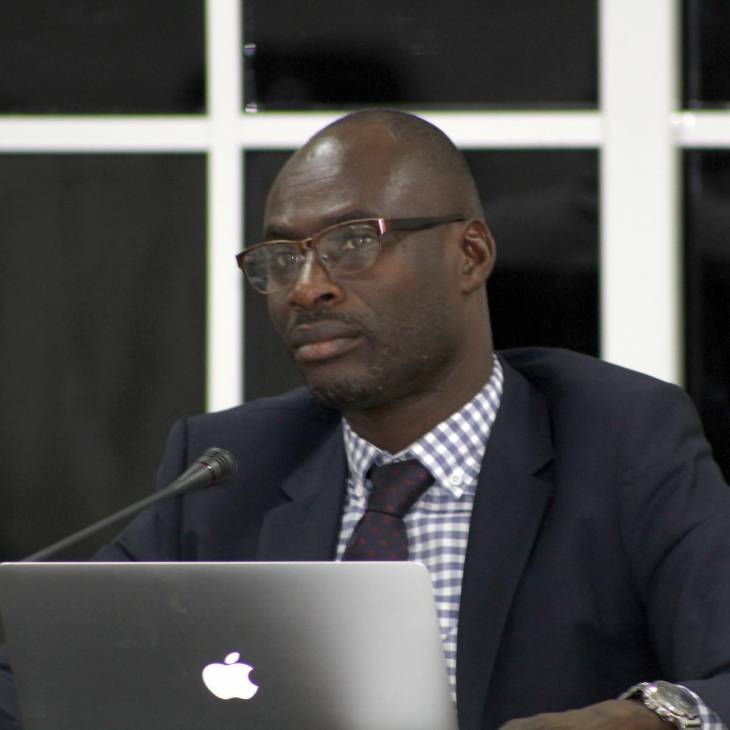
Investigations and hearings of the TRRC are guided by the lead counsel Essa Faal. Until his appointment little was known about Faal in Gambia despite his accomplishments as a lawyer. Today Faal is a household name in the country.
Faal started his legal career as a State Counsel at the Ministry of Justice in 1994, the year Yahya Jammeh overthrew the government of Dawda Kairaba Jawara. By the end of 1997, he was appointed as First Secretary and later Counselor for Legal Affairs at the Gambia Permanent Mission to the United Nations, in New York.
In January 2000, Faal was appointed by the United Nations as a Judicial Affairs Officer and was deployed to the UN transitional administration in East Timor, where he contributed to the re-organisation of the justice sector. He would later be promoted as Acting Deputy General Prosecutor for Serious Crimes and then chief of prosecutions in 2002.
In January 2005, Faal joined the International Development Law Organisation, based in Rome where he designed, supervised and directed the implementation of good governance and justice sector reform programmes for developing countries around the world.
A year later, he joined the International Criminal Court (ICC) where he worked on the investigations into the Darfur situation, Sudan, that led to the ICC’s indictment of the then president of Sudan, Omar Al Bashir.
Fall was later appointed as a senior trial lawyer for the Darfur case. Before he made a career shift from hunting the alleged rights violators to defending them. From March 2011 to September 2016, Faal served as Co-Lead Defence Counsel before the ICC in the cases against Kenyan leaders Francis Kirimi Muthaura, Uhuru Muigai Kenyatta, William Ruto, and General Muhammed Hussein Ali.
Faal also served as Counsel for Lybia’s Saif Al Islam Gadafi before the ICC, and for Charles Ghankay Taylor, a former President of Liberia, before the Residual Special Court for Sierra Leone.
Critics said that while the desire for justice may have led Faal to defend victims in the Darfur and Philippines cases before the ICC, it was handsome pay that led him to defend Kenyatta, Taylor and others. In a recent media interview with Gambian online platform Kerr Fatou, Faal responded that he is a lawyer and it is only right that everyone is given the presumption of innocence they deserve. He described Kenya’s president Uhuru Kenyatta as an “interesting” man.
Undoubtedly, Faal has returned to Gambia a different man — more experienced and known internationally. He comes to the TRRC with a Cadillac Escalade or a black Porsche Cayenne. By all standards, he is always eloquent and well prepared. His mode of questioning is very robust, though it may be described by some as arrogant. Faal defends his tough questioning as a vital part of his job to solicit the right answers from people who are seemingly uncooperative.
For anything Fall considers the right thing to do, he is generally seen as someone who barely entertain dissent. He called lawyers critical of his performance “the armchair lawyers”. He equally retorted criticism against him for giving a plot of land to a TRRC witness.
At Gambia’s TRRC, people not only keenly follow the proceedings, they raise money for some victims who lost important material and human resources. Two individuals have so far benefitted from such private fund-raising. One of them is Mafugie Sonko, a low-ranking soldier who spent 9 years in jail without a single court appearance, and who was the 27th witness to appear before the TRRC.
Through “go-fund-me” on social media, Sonko received 175, 000 dalasi (3,500 USD). While the money was being given to him at the TRRC, lead counsel Essa Faal gave Sonko a plot land.
This drew criticism from people who said the TRRC should not allow its venue to be used for such gifts since it can be misconstrued as reparations for Sonko by some other victims. Faal nevertheless defended his actions as an act of goodwill that should be emulated.
“I am not going to apologize for that,” he snapped. People close to him said he is often known for generous gifts, something, he said, “Gambians are known for”.


Comments are closed.